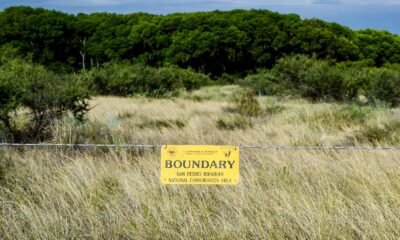arizona
Arizona Appeals Court Upholds Tucson Murder Convict’s Sentence

The Arizona Court of Appeals recently dismissed the claims of Christopher Clements, a man serving life sentences for the murders of two young girls. Clements argued that improper evidence led to his wrongful conviction. However, a three-judge panel found “overwhelming evidence” supporting his guilt in the case of Maribel Gonzalez.
The panel’s ruling, articulated by Justice Jeffrey Sklar, emphasized Clements’ clear intentions to injure Gonzalez. Evidence included DNA consistent with Clements found in the victim’s pubic area, coupled with his attempts to conceal both his actions and Gonzalez’s body. Clements was convicted in September 2022 for the kidnapping and murder of 13-year-old Gonzalez, who vanished in Tucson, Arizona, in 2014. In addition, he was found guilty in March of murdering 6-year-old Isabel Celis, a case that garnered national attention.
In challenging the conviction for Gonzalez’s murder, Clements contended the trial court failed to instruct the jury adequately. He cited a significant delay in DNA testing performed on trace amounts gathered from Gonzalez’s body. Although evidence from anal swabs did not yield a definitive match to Clements, the panel concluded that the presence of matching DNA found in Gonzalez’s hair excluded other suspects and underscored Clements’ involvement.
While the appeals court identified certain errors in the trial court’s procedures, they ruled these did not unfairly impact the trial’s outcome. “At most, it might have suggested that another person was also involved in M.G.’s death,” Sklar noted, highlighting the sufficiency of existing evidence against Clements.
Prosecutors presented thousands of images from Clements’ phone depicting “child erotica” and photographs of unsuspecting young Hispanic girls. These materials aimed to establish a motive, suggesting an obsession with girls resembling Gonzalez. However, Justice Sklar criticized the trial court for not adequately explaining the relevance of this evidence to Clements’ intentions regarding the murder or kidnapping.
Despite acknowledging the improper admission of photographic evidence, the appeals panel ruled that it was not materially harmful in light of the overwhelming proof of Clements’ guilt. Defense attorney Eric Kessler indicated intentions to appeal to the Supreme Court, intending to focus on aspects the court appeared sympathetic to, particularly concerning the evidence of the photos and issues surrounding cell phone coverage maps.
These maps sparked controversy during the trial, as they illustrated conflicting information regarding Clements’ location at the time of Gonzalez’s disappearance. After acknowledging disclosure violations, the state contended that the errors did not compromise the trial’s integrity. The appeals court underscored the appropriateness of restricting specific evidence but supported denying a complete dismissal of expert testimony.
The attorney general’s office has opted not to comment on the court’s decision.

















